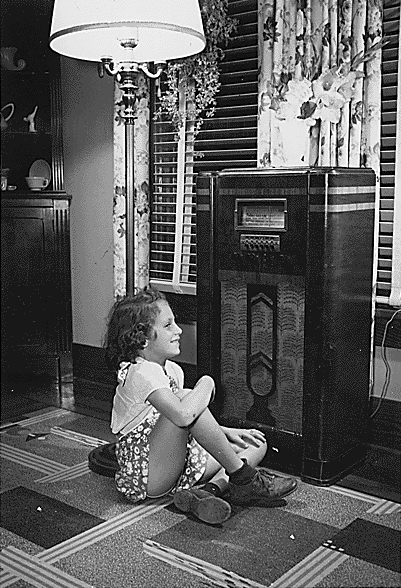 Imagine this: 100 years ago radios were not in every car and bedroom, but only in the homes of the wealthy or the military.
Imagine this: 100 years ago radios were not in every car and bedroom, but only in the homes of the wealthy or the military. What would you do if you could not listen to your favorite band, singer, or quartet? Remember there's no YouTube or TV either! How did people pass the time?
How did you guess I would say "make music"?
My theory is this: to help pass the time in enjoyable ways that rested their usual mental state (or stretched them in a different intellectual way) they made music together. (I will also accept the answers of baking/cooking together, build things (like barns) together, create craft/handiwork together, but this is a music blog!)
 In making music together, people shared company doing an activity with a common goal. Some groups may have been highly trained professionals, but I want to think about the amateurs that gathered 'round the piano after supper to sing or the string players who met on Sat afternoons to read Haydn quartets. Why did they play together? Did they not like performing or did not have opportunities to perform? Did playing aggressive allegros and sweet andantes give them a vehicle for the irritations and kindnesses to flow from their soul?
In making music together, people shared company doing an activity with a common goal. Some groups may have been highly trained professionals, but I want to think about the amateurs that gathered 'round the piano after supper to sing or the string players who met on Sat afternoons to read Haydn quartets. Why did they play together? Did they not like performing or did not have opportunities to perform? Did playing aggressive allegros and sweet andantes give them a vehicle for the irritations and kindnesses to flow from their soul? I worry about people today, that they're taking in too much of other people's songs and not getting in touch with their own and giving it a vehicle to be released. I believe making music, even if it is someone else's composition, helps us process our inner emotions and voice. Sometimes musical ad jiggles program us to want this or that material ideal, but overall I believe making sounds and especially getting in touch with the song that is within us every moment of every day is important in claiming our individuality within the harmonic weave of billions of other people.
So how does one do that?
If you were once told not to sing, defy that advice! You are probably now older than the person that told you that and unfortunately that person didn't have the training, time or energy to spend in helping you match pitch. I believe to the depths of my bones that if you can talk, you can sing and it's just part of a spectrum of activites. A baby human doesn't automatically know how to dance. It first needs to learn how to move and control its limbs in space, then organizes them into crawling, standing, walking, running and dancing! (would you believe that I also believe everyone can dance?). So, start playing with the way your voice asks questions, gives commands, shares enthusiasm and gives encouragement. Our English language isn't as tonal as Mandarin Chinese, but it does rise and fall (see Scientific America's recent article about speech and minor thirds). Then sing in the shower, in your car (like the guy I saw this afternoon! I want to see everyone enjoying their time at stoplights!) and other mostly isolated places until you feel confidently comfortable about the instrument that is all yours.
Feeling ready to make music with others? Look up the plentiful community bands and choirs in metro areas. If you live in the Minneapolis-St. Paul metro, come to my community song circle on Sunday afternoon (details here). You don't even need to be able to read music! Don't live nearby and/or your community doesn't have a community music group? Call up some friends, find a date for all of you to meet and create your own hootenanny. There's no music police to say you're not playing that F chord in tune or mistakes cannot be made. Remember this is for fun! (just beware of cranking your amp too high and not to fall off your chair or train from laughing with glee).
(p.s. if you liked this post, please share it with your friends & family. thanks!)
(p.s. if you liked this post, please share it with your friends & family. thanks!)

No comments:
Post a Comment